牛津译林版七年级下册Unit 7 Abilities复习课件(共94张PPT)
文档属性
| 名称 | 牛津译林版七年级下册Unit 7 Abilities复习课件(共94张PPT) | 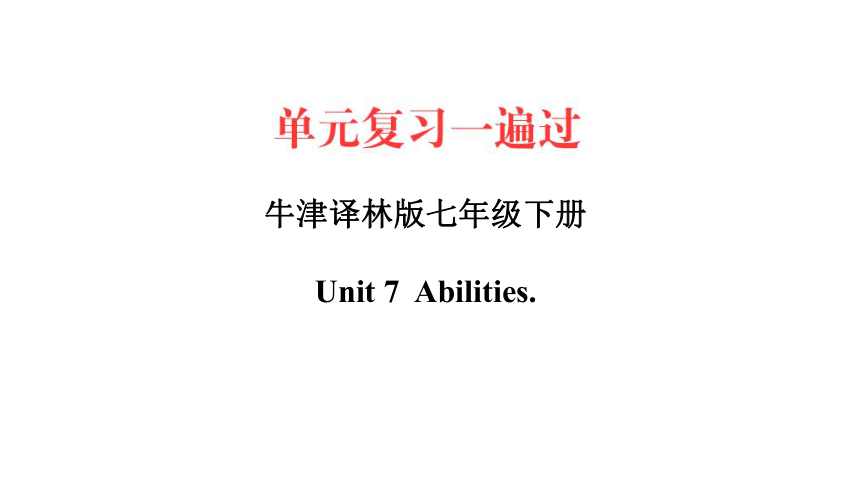 | |
| 格式 | pptx | ||
| 文件大小 | 404.8KB | ||
| 资源类型 | 教案 | ||
| 版本资源 | 牛津译林版 | ||
| 科目 | 英语 | ||
| 更新时间 | 2023-05-07 21:06:14 | ||
图片预览

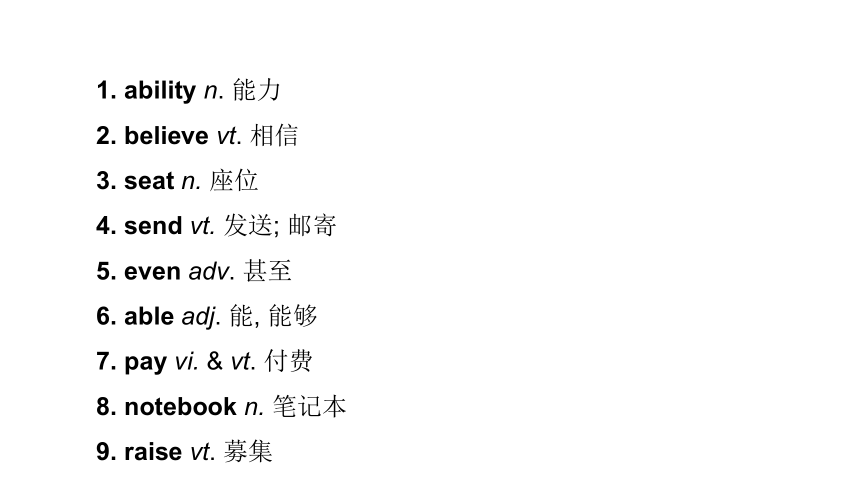
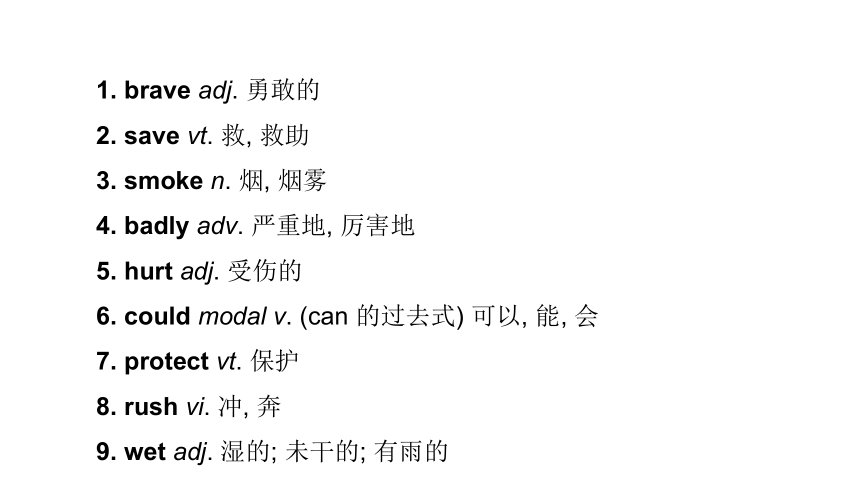
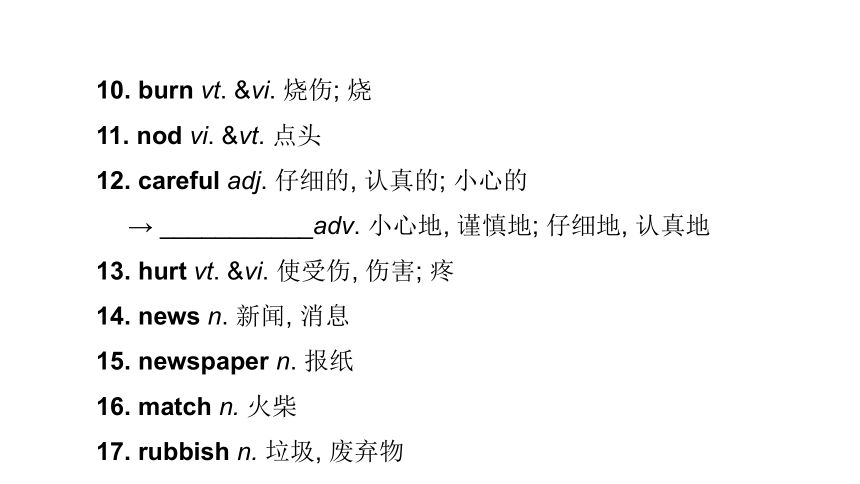
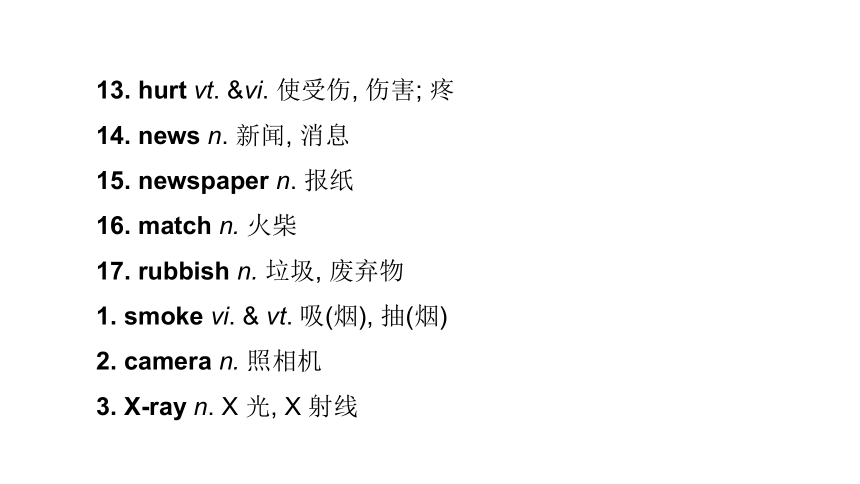
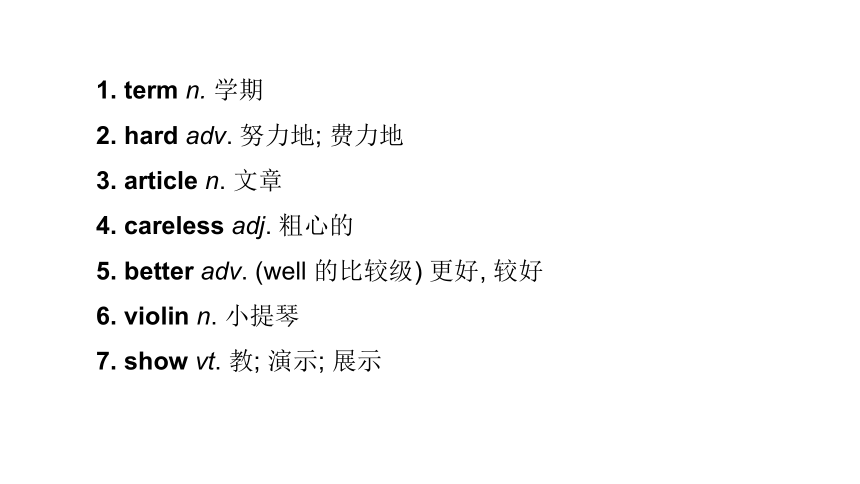
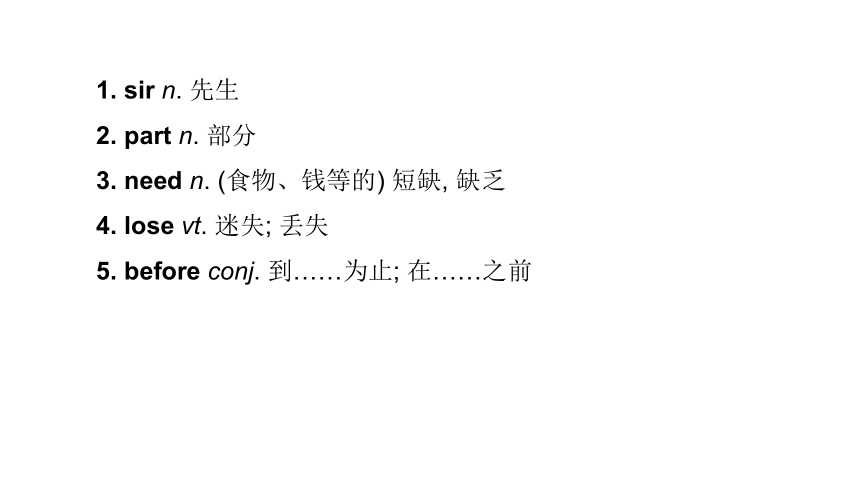
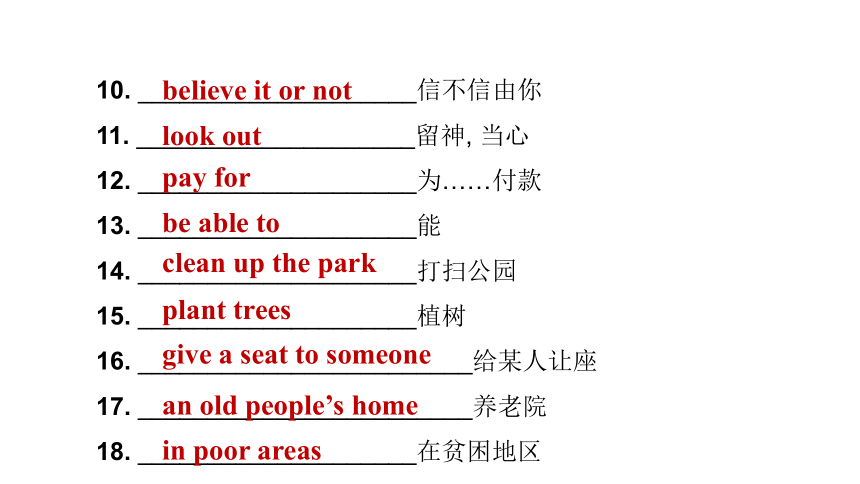
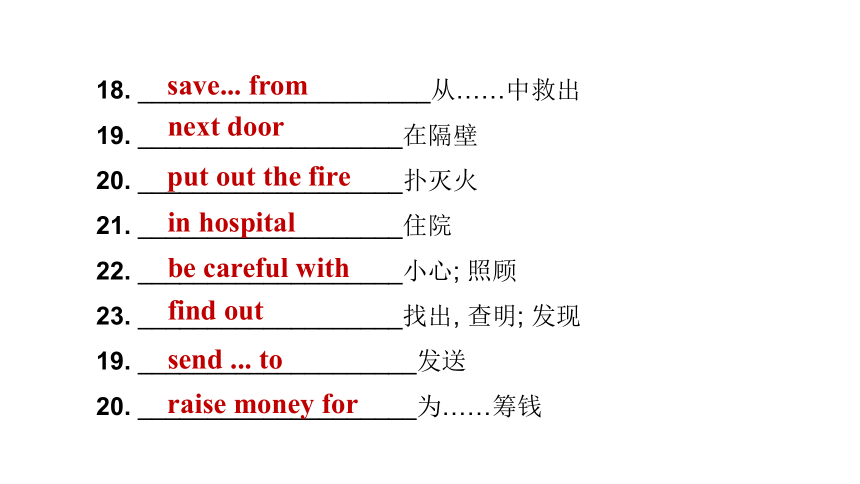
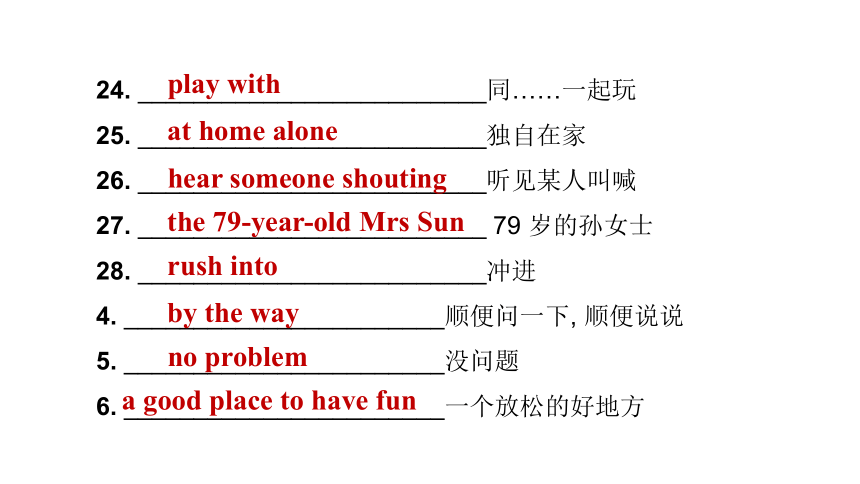
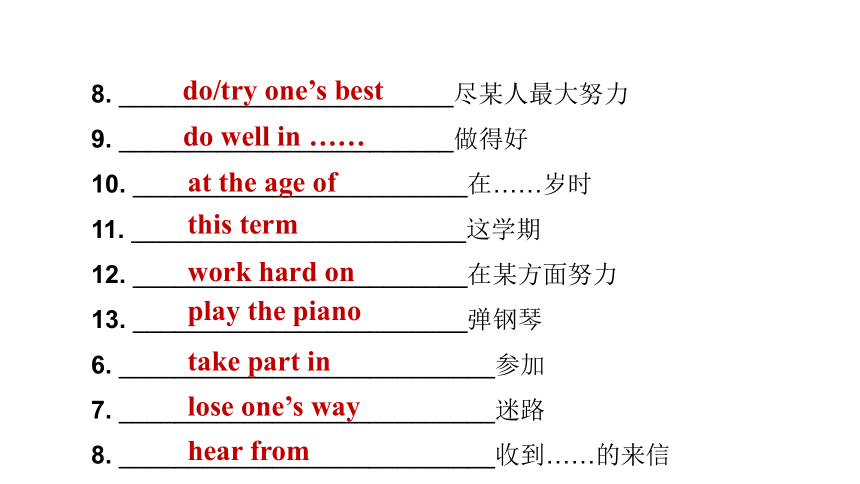
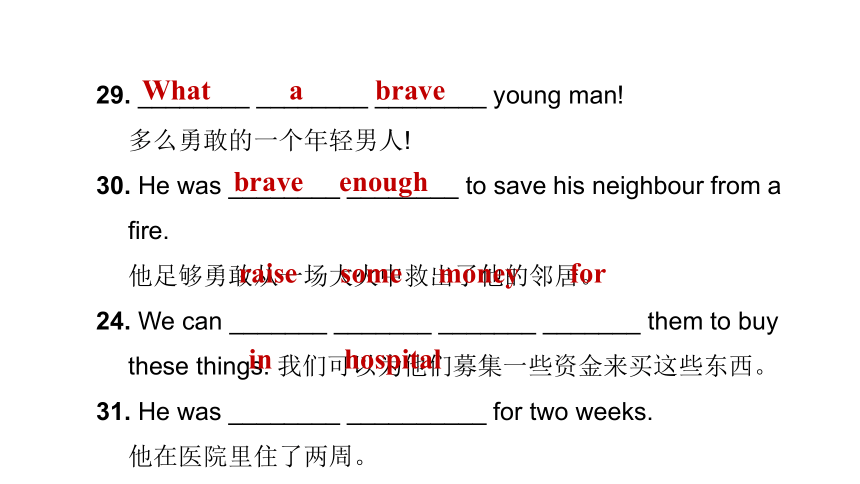
文档简介
(共94张PPT)
牛津译林版七年级下册
Unit 7 Abilities.
1. ability n. 能力
2. believe vt. 相信
3. seat n. 座位
4. send vt. 发送; 邮寄
5. even adv. 甚至
6. able adj. 能, 能够
7. pay vi. & vt. 付费
8. notebook n. 笔记本
9. raise vt. 募集
1. brave adj. 勇敢的
2. save vt. 救, 救助
3. smoke n. 烟, 烟雾
4. badly adv. 严重地, 厉害地
5. hurt adj. 受伤的
6. could modal v. (can 的过去式) 可以, 能, 会
7. protect vt. 保护
8. rush vi. 冲, 奔
9. wet adj. 湿的; 未干的; 有雨的
10. burn vt. &vi. 烧伤; 烧
11. nod vi. &vt. 点头
12. careful adj. 仔细的, 认真的; 小心的
→ ___________adv. 小心地, 谨慎地; 仔细地, 认真地
13. hurt vt. &vi. 使受伤, 伤害; 疼
14. news n. 新闻, 消息
15. newspaper n. 报纸
16. match n. 火柴
17. rubbish n. 垃圾, 废弃物
13. hurt vt. &vi. 使受伤, 伤害; 疼
14. news n. 新闻, 消息
15. newspaper n. 报纸
16. match n. 火柴
17. rubbish n. 垃圾, 废弃物
1. smoke vi. & vt. 吸(烟), 抽(烟)
2. camera n. 照相机
3. X-ray n. X 光, X 射线
1. term n. 学期
2. hard adv. 努力地; 费力地
3. article n. 文章
4. careless adj. 粗心的
5. better adv. (well 的比较级) 更好, 较好
6. violin n. 小提琴
7. show vt. 教; 演示; 展示
1. sir n. 先生
2. part n. 部分
3. need n. (食物、钱等的) 短缺, 缺乏
4. lose vt. 迷失; 丢失
5. before conj. 到……为止; 在……之前
10. ____________________信不信由你
11. ____________________留神, 当心
12. ____________________为……付款
13. ____________________能
14. ____________________打扫公园
15. ____________________植树
16. ________________________给某人让座
17. ________________________养老院
18. ____________________在贫困地区
believe it or not
look out
pay for
be able to
clean up the park
plant trees
give a seat to someone
an old people’s home
in poor areas
18. _____________________从……中救出
19. ___________________在隔壁
20. ___________________扑灭火
21. ___________________住院
22. ___________________小心; 照顾
23. ___________________找出, 查明; 发现
19. ____________________发送
20. ____________________为……筹钱
save... from
next door
put out the fire
in hospital
be careful with
find out
send ... to
raise money for
24. _________________________同……一起玩
25. _________________________独自在家
26. _________________________听见某人叫喊
27. _________________________ 79 岁的孙女士
28. _________________________冲进
4. _______________________顺便问一下, 顺便说说
5. _______________________没问题
6. _______________________一个放松的好地方
play with
at home alone
hear someone shouting
the 79-year-old Mrs Sun
rush into
by the way
no problem
a good place to have fun
8. ________________________尽某人最大努力
9. ________________________做得好
10. ________________________在……岁时
11. ________________________这学期
12. ________________________在某方面努力
13. ________________________弹钢琴
6. ___________________________参加
7. ___________________________迷路
8. ___________________________收到……的来信
do/try one’s best
do well in ……
at the age of
this term
work hard on
play the piano
take part in
lose one’s way
hear from
29. ________ ________ ________ young man!
多么勇敢的一个年轻男人!
30. He was ________ ________ to save his neighbour from a fire.
他足够勇敢从一场大火中救出了他的邻居。
24. We can _______ _______ _______ _______ them to buy these things. 我们可以为他们募集一些资金来买这些东西。
31. He was ________ __________ for two weeks.
他在医院里住了两周。
What a brave
brave enough
raise some money for
in hospital
32. ________ ________ you are! 你真勇敢!
33. That ________ dangerous. 那听起来很危险。
7. _______________________(it is) !
(它是) 多漂亮的一朵花啊!
8. _______________________(they are)!
(它们是) 漂亮的花啊!
9. _______________________(he has)!
(他有) 多么有趣的一个主意啊!
What a beautiful flower
What beautiful flowers
What an interesting idea
How brave
sounds
10. _______________________(you have)!
(你有) 多么有趣的主意啊!
11. _______________________(it is) !
(它是) 多么好听的音乐!
12. _______________________(the music is)!
(音乐是) 多么好听啊!
13. He can fly _______ _______ _______ light.
他能飞得像光一样快。
What interesting ideas
What nice music
How nice
as fast as
14. She needs to ________ ________ and ________ ________.
她需要读更多, 讲更多。
15. She ________ ________ ________ ________ it.
关于它她知道很多。
16. Can you show me ________ ________ ________ it
你能给我展示一下如何拉它吗
12. We _______ __________ _______ hearing from you soon.
我们期盼尽快收到您的来信。
read more speak more
knows a lot about
how to play
look forward to
10. I would like to ___________ Chen Dan ________ this year’s Young Star Award.
我想推荐陈丹获得今年的“新星奖”。
11. He stayed with the boy and played with him _______ _______ _______ before the boy’s parents came.
在男孩的父母到来之前, 他和那个男孩待在一起, 并陪他玩了两个小时。
recommend for
for
two hours
这三个都是情态动词。情态动词本身有一定的意义, 但它们没有人称和数的变化, 需和动词一起构成句子的谓语, 表示说话者的情感、态度和语气。
can, could, may 的用法
can 和could 表示能力
(1) can 是最常用的情态动词, 意为“能, 会”, 用来谈论某人现在的能力;could 是can 的过去式, 用来谈论某人过去的能力。
e.g. I couldn’t understand his words last year, but now I can. 去年我还不能理解他的话, 但现在我能理解了。
(2) can 谈论能力时, 其同义词组为be able to, 意为“能够, 会”, 后跟动词原形, 二者一般可互换。但can 只用于现在时和过去时(could) 两种时态, 如果要用于其他时态, 如一般将来时等, 就需要使用be able to。
e.g. You will be able to pass the exam tomorrow.
明天你能通过考试。
中考在线1:What an amazing robot! It _______ cook more than 5, 000 dishes.
A. shall B. need C. must D. can
【解析】考查情态动词的用法辨析。句意:多么令人惊讶的机器人啊!它能够烹饪5000 多种菜肴。shall 将要;need 需要;must 必须, 一定;can 能, 表能力。表示能力, 应用can。故选D。
D
can, could 和may 表示许可
我们也可以用情态动词can, could 和may 来表示
请求或许可。情态动词could 表示一种委婉的语气, 比用can 表达更有礼貌, 常用于问句中。
[易错点]其回答不能用could, 只能用can。 may 比can 更正式。
e.g. —Could I borrow your ruler ?
我可以借你的尺子吗?
—Yes, you can. 是的, 你可以。
/—Sorry, you can’t. 对不起, 你不可以。
中考在线:—______ I take a seat here
—No, you can’t. They’re only for the old and children.
A. May B. Must C. Will
【解析】考查情态动词的用法。根据下文“不, 你不能。它们只是为老人和孩子们准备的。”可知, 本句为询问“我可以坐在这儿吗 ”may 意为“可以”。故选A。
A
can 和may 表示推测
can 表示推测时, 常用于否定句, can’t 意为“不可能”;may 表示没有把握的猜测, 意为“可能”。
e.g. He may be at home now. 他现在可能在家里。
The Japanese book can’t be Alice’s. She studies English.
这本日语书不可能是爱丽丝的。她学英语。
中考在线:—What will the weather be like tomorrow
— It _______ be rainy, cloudy or sunny. I am not sure. A. must B. may C. can’t D.should
【解析】考查情态动词的用法。句意:—明天天气
如何?—可能会下雨、阴天或晴天。我不确定。由“I
am not sure”可知, 空格中表示可能的推断。故选B。
B
感叹句
感叹句是用来表达喜怒哀乐等强烈感情的句子。感叹句一般由what 或how 引导, 句末加感叹号。what 修饰名词, how 修饰形容词、副词或动词。
[重点] 感叹句的构成:
(1) what 引导的感叹句的主要句型:
考向
what 的基本句型 例句
What+ a/an+ 形容词+ 可数名词单数(+ 主语+ 谓语)! (以元音音素开头的形容词前面要用an) What an interesting story (it is) !
多么有趣的故事啊!
what 的基本句型 例句
What+ 形容词+ 可数名词复数(+ 主语+ 谓语) ! What beautiful flowers (they are) !
多么漂亮的花啊!
What+ 形容词+ 不可数名词(+ 主语+ 谓语) ! What delicious food (it is) !
多么好吃的食物啊!
中考在线:______ exciting news! The Chinese team successfully arrived at the peak of Qomolangma.
A. What B. What an C. How D. How an
【解析】本题用语法判定法。考查感叹句用法。句意:多么令人兴奋的消息! 中国登山队成功登顶珠峰。句中exciting news 是由形容词exciting 修饰名词news 的名词短语, 所以需要用what, 而news 是不可数名词, 不加冠词。故选A。
A
中考在线:—Look! The kids are playing on the playground.
—_______ great time they are having!
A. What B. How C. What a D. How a
【解析】本题用语法判定法。考查感叹句。句意:—看!孩子们正在操场上玩。—他们玩得多开心啊!本题符合感叹句“What+(a/an+) 形容词+ 名词+主语+ 谓语+ 其他!”结构, 句子中心词是time, 短语have a good time, 应用what a 引导感叹句, 故选C。
C
(2) how 引导的感叹句的主要句型:
how 的基本句型 例句
How+ 形容词(+主语+谓语) ! How kind (the girl is) !
(这个女孩) 多么善良啊!
How+ 副词(+主语+谓语) ! How well (she dances) !
(她舞跳得) 多好啊!
How+ 主语+ 谓语!(此句型中how 修饰动词, 但动词不提前。) How time flies!
时间过得真快呀!
中考在线:—_______ smart! This new kind of taxi can go without a driver.
—Amazing! Let’s have a try.
A. What B. How C. What a
【解析】考查感叹句用法。句意:—这个无人驾驶汽车是多么智能呀!本题是“How + adj./adv. + (主语+ 谓语) !” 感叹句结构。故选B。
B
1. Mary said she ___________ not sing Chinese songs.
2. I have six dogs. You __________ choose any of them.
3. Tom said that he __________ not put his heart into any work.
4. The boy __________ not be Jack. He has gone to China with his parents.
5. —Where is my card
—I don’t know. It __________ be in your bag.
一、用适当的情态动词填空
could
can/may
could
can
may
6. I can speak English. (改为一般疑问句, 并作否定回答)
__________ you __________ English
__________, I __________.
7. The old man could ride a horse. (改为同义句)
The old man ________ ________ ________ ride a horse.
二、句型转换
Can speak
No can’t
was able to
8. The food is very nice. (改为感叹句)
__________ __________ __________ it is!
9. What beautiful flowers they are! (改为感叹句)
__________ _____________ the flowers are! [黔南]
10. It is fine weather to row a boat on the lake. (改为感叹句)
__________ __________ weather it is to row a boat on the lake!
What nice food
How beautiful
What fine
Believe it or not!
believe /b 'li v/ vt. 相信
辨析:believe 与believe in
believe 表示相信某人的话,相信某事等。
believe in 常表示“信任,信赖”,多指品德上的相信。
believe it or not 是口语里常用的句子,其实是个省略的句子,完整的句子为:Whether you believe it or not.。
中考在线:It’s nice to hear from her again. _______, we last met more than ten years ago.
A. What’s worse B. Believe it or not
C. In other words D. That’s to say
B
【解析】考查交际用语。 句意:再次收到她的来信真好。____,我们最后一次见面是十多年前的事了。What’s worse 更糟的是;Believe it or not 信不信由你;In other words 换言之;That’s to say 那就是说。 根据后面的上次见面是十多年前,结合语境可知表示“不可置否”的事实。
Look out, Eddie!
look out 留神,当心
e.g. Look out! There is a lot of traffic.
当心! 有很多来往车辆。
Look out! That step is not safe!
注意!那个台阶有危险!
look out 与be careful 的意义相近,用来提醒他人当心,注意某人或某事。
辨析:look out 与be careful
look out 语气较强,用于某种紧急情况或可能出现危险的场合。
be careful 是一般的警告或劝告用语,既可单独使用也可跟动词不定式或与with 构成短语。
People have different abilities.
ability / 'b l ti/ n. 能力
e.g. He has the ability to do the work.
他有做这项工作的能力。
He is an able man. He is able to do a lot of things.
他是一个有能力的人。他能做许多事情。
复数为abilities
be able to do sth.
能干某事,会干某事
ability(n.) 能力
able(adj.) 有能力的
special abilities
特殊才能
improve one’s ability
提高某人的能力
cleaning up the park
clean up 打扫, 清理, 整理
e.g. Please clean up the classroom before you leave.
在你离开前请把教室打扫干净。
The room is too dirty. Clean it up, please.
这房间太脏了。请把它打扫干净。
clean up+n./clean+n.+up
代词只能放中间
中考在线:All the students in Grade Three are going to ________ the banks of the Xiangjiang River.
A. turn up B. give up C. clean up
【解析】考查动词短语辨析。句意:所有三年级的学生将要去清理湘江的河岸。turn up 出现;give up 放弃;clean up 清理。
C
giving a seat to someone on the bus
give a seat to 让座给……
e.g. Will you please give your seat to this old man
请把你的座位让给这位老人好吗?
He gave a book to me yesterday.
=He gave me a book yesterday.
他昨天给了我一本书。
give sth. to sb. =give sb. sth. 给某人某物(当sth. 为代词时,通常用give sth. to sb.)
We can send some to them.
send /send/ vt. 发送;邮寄;派遣
e.g. I will send you some new books.
我将寄一些新书给你。
send some new books to you
与send 有关的短语:
① send for
派人去取,派人去请
② send up 发射
③ send away 解雇
even able to pay for pens and notebooks.
even /'i vn/ adv. 甚至
e.g. Peter is not even able to ride a bike.
彼得甚至连自行车都不会骑。
Even a child can tell the story.
连一个孩子都能讲出这个故事。
This film is even better than that one.
这部电影甚至比那部还要好。
even 在句中起加强语气的作用
even+ 形容词比较级,“甚至更;还(要)”
able /'e bl/ adj. 能, 能够
e.g. She won’t be able to play basketball for three months.
她将三个月不能打篮球。
难点&辨析:be able to 与can
be able to 强调在具体事件中有能力,有人称和数的变化,可用于多种时态。
can 通常指一般性的能力,表示“有能力做某事”,通常只有两种时态形式:can 和could。
速记小法:
pay for 的用法:pay for 只跟物,紧相连,见了钱,把脸翻,pay 与for 位于钱两边。即:pay for 见钱分开,pay+ 金钱+for sth.
中考在线6:How much did you __________ (付费) your new bicycle
[黔西南州改编]
【点拨】how much 意为“多少钱”,为……付钱用pay for。
pay for
返回
raise
raise /re z/ vt. 募集
e.g. They are raising money.
他们正在募捐。
We will raise money for charity.
我们将为慈善募捐。
raise+n.
为……筹募钱财
1. 当心!有辆汽车来了。
_____________________! There’s a car coming.
2. 你信不信,反正我通过了考试
_____________________, I passed the exam.
根据汉语意思完成句子
Look/Watch out
Believe it or not
3. 请把你的座位让给这位老人好吗
Will you please ___________________ this old man
4. 一些孩子甚至付不起上学的费用。
Some children are not ______________________ school.
5. 我认为我们应为他们筹集一些钱。
I think we _____________________________ them.
give the seat to
even able to pay for
should raise some money for
save
save /se v/ vt. 救; 救助
e.g. The young man saved her.
这个年轻人救了她。
He saved me from drowning.
他救了我,使我免遭溺死。
The doctor saved the woman’s life.
这位医生救了那个妇女的命。
save sb 救某人
save...from... 从……中救出……
save one’s life
救某人的命
smoke
smoke /sm k/ n. 烟,烟雾
e.g. There is no smoke without fire.
无火不生烟。/ 无风不起浪。(谚语)
The chimney is smoking. 烟囱正在冒烟。
Do you smoke 你吸烟吗
un.
动词,冒烟
动词,抽烟
smoke n. 烟,烟雾
v. 冒烟;抽烟
the 79-year-old
79-year-old 79 岁的
e.g. a five-year plan 一个五年计划
a ten-year-old boy 一个十岁的男孩儿
复合形容词通常在句中作定语, 修饰后面的名词。有两种形式:
①“数词+ 名词”,中间用连字符连接;
②“数词+ 名词+ 形容词”,中间用连字符连接,该结构中的名词必须是单数形式。
hurt
hurt /h t/ adj. 受伤的
e.g. Luckily, no one was hurt in the car accident.
幸运的是,车祸中没有人受伤。
Look out! The knife may hurt you.
小心!那刀可能会伤到你。
What she said hurt my feelings deeply.
她的话深深地伤害了我的感情。
My back hurts. 我的后背疼。
hurt—hurt—hurt
adj. 受伤的
v. 使受伤
v. 伤害,使不快
v.疼痛
protect
protect /pr 'tekt/ vt. 保护
e.g. We should protect our eyes.
我们应该保护我们的眼睛。
Wearing dark glasses can protect your eyes against / from the sun.
戴墨镜可以保护你的眼睛不受阳光照射。
protect + 宾语 + against / from... 意为“保护……不受……”
protect 的词形变化:
rushed into
rush into 冲进……
e.g. He rushed into my house.
他冲进了我的房子。
The children rushed out of the classroom.
孩子们冲出了教室。
冲出
He was in hospital for two weeks.
in hospital 住院
e.g. Mr Zhang is ill in hospital. 张先生生病住院了。
辨析: in hospital 与in the hospital
in hospital (生病) 住院 指病人生病住院。
in the hospital 在医院里 hospital 前加冠词the 表示一个具体的地点。
news
news /nju z/ n. 新闻; 消息
e.g. No news is good news.
没有消息就是好消息。
Look! Here is a piece of news.
看!这儿有条消息。
常用good/bad 修饰
一条消息
几条消息用some pieces of news。
un.
Keep your hair away from fire.
keep... away from... 使……远离……
e.g. You must keep your child away from that dog.
一定要让你的孩子远离那条狗。
We must keep/prevent/stop the children from playing in the street. 我们必须阻止孩子们在街上玩。
keep sb. /sth. from doing sth. =prevent sb. /sth. from doing sth. =stop sb. /sth. from doing sth.
拓展:keep 用法归类:
keep+ 形容词 “保持……状态” I want to keep fit. 我想要保持健康。
keep(+ 语)+doing sth. “(使……)一直做某事” Keep trying, and you’ll succeed.
坚持不懈,你就会成功。
keep+ 宾语+ 宾语补足语(介词短语、形容词等) Please keep your hands behind your back. 请把手放在背后。
1. Lin Tao was __________ (勇敢的) enough to save his neighbour from a fire.
2. The fire _________________(烧毁) the whole house last year.
3. The __________ (垃圾) bin is full. Who can empty it
4. Who can send today’s ____________(报纸) to the old people’s home
5. Animals know many ways to __________(保护) themselves.
一、根据汉语提示完成句子
brave
burnt/burned
rubbish
newspaper
protect
By the way
by the way 顺便问一下, 顺便说说
e.g. What’s the time, by the way
顺便问一句, 几点钟了?
口语中的常用语。通常用作插入语,表示说话人要转入一个新话题。
与way相关的短语还有:
① all the way 自始至终
② on one’s way to 在某人去……的路上
③ lose one’s way 迷路
④ in the way 挡道
No problem.
No problem. 没问题。
e.g. —Could you help me carry the bag It’s so heavy.
你能帮我拿一下那个包吗?它太沉了。
—No problem! 没问题!
no problem 可以用在不同场合。当表示愿意相助或事情容易做时可以说no problem,意思是“没问题”;回答别人的道谢或道歉时,也可以说no problem,意思是“不客气、没关系”。
work hard
work hard 努力学习; 辛勤工作
e.g. The ice is as hard as a rock.
冰像石头一样硬。
The question is very hard.
这个问题很难。
She tried hard, but failed.
她努力尝试过, 但未能成功。
形容词,坚硬的
形容词,难的
adv. 努力地
易错&辨析: work hard, hard work 与hard-working
work hard 意为“辛勤工作”,work 是动词,hard 是副词,为动词性短语。
hard work 意为“困难的工作”,hard 是形容词, work 是名词,为名词短语,在句中可作主语、宾语、表语。
hard-working 意为“努力工作的,勤奋的”,整体是个形容词,在句中常作定语。
do her best
do one’s best 尽某人最大努力
e.g. I will do my best to learn English well.
我会尽我最大努力学好英语。
do one’s best to do sth.
=try one’s best to do sth.
尽某人最大努力去做某事
中考在线:Many children are left alone in the countryside. Let’s do our best ________ them.
A. help B. helping C. to help D. helps
【解析】考查固定短语。句意:许多孩子被独自留在农村。让我们尽最大努力帮助他们。do one’s best to do sth.“尽某人最大努力做某事”,为固定短语。故选C。
C
at the age of
at the age of 在……岁时
e.g. She began to learn English at the age of six.
= She began to learn English when she was six years old.
她在六岁时开始学英语。
at the age of 可与when... be ...
[year(s) old]互相转化。
show
show / / vt. 教; 演示; 展示
e.g. Can you show me how to use this camera
你能向我示范一下怎么使用这台相机吗?
My mother showed me how to make dumplings.
妈妈教我如何包饺子。
show
v.展示
n. 展览;表演
show sth. 展示某物
show sb. +how+to do...
教某人如何做……
show sb. sth. (=show sth. to sb.)
向某人展示某物
show sb. around 带领某人参观
1. She could swim when she was five. (改为同义句)
She could swim ________ _________ _________ ________ five.
2. He is good at maths. (改为同义句)
He __________ __________ __________ maths.
一、句型转换
at the age of
does well in
3. Simon always does his best to learn Chinese. (改为一般疑问句)
_________ Simon always _________ his best to learn Chinese
4. He can learn things quickly. (改为一般疑问句)
__________ __________ learn things quickly
5. That school art festival was very wonderful. (改为感叹句)
________ ____________ that school art festival was!
Does do
Can he
How wonderful
recommend
recommend sb. for/as... 推荐某人……
e.g. We want to recommend Li Hong for the post.
我们想推荐李红担任这个职位。
The children recommended Mr White as the cook.
孩子们推荐怀特先生当厨师。
① recommend sth. 推荐某物
② recommend sb. as...推荐某人成为……
need.
need /ni d/ n.(食物、钱等的) 短缺, 缺乏
e.g. Lily is helpful and she always helps people in need.
莉莉乐于助人,她总是帮助贫困的人。
in (great) need of (特别)需要
There’s no need to do sth.
没必要做某事
实义v. “需要”
情态v.“需要”(无人称和数的变化)
need
n.
lost
lose /lu z/ vt. 迷失, 丢失
e.g. She lost her husband in the crowd.
她在人群中与丈夫走散了。
I can’t find the lost book. 我找不到丢失的书。
The tourists lost their way/got lost in the big city yesterday.
昨天游客们在这个大城市里迷路了。
过去式为lost
adj. 丢失的;迷失的
lose one’s way
=get lost 迷路
before
before/b 'f (r)/ conj. 到……为止;在……之前
e.g. It will be eight years before we meet.
八年以后我们才能相见。
辨析: before 与ago
考向
before 副词,可单独使用,用于一般过去时或现在完成时,表示不明确的以前。
还可作介词,后接时间点。
也可作连词,引导时间状语从句。
ago 副词,不能用作介词或连词;表示从说话时刻算起的若干时间以前,用于一段时间之后,常用于一般过去时。
hear from
hear from sb. 收到某人的来信
e.g. I often hear from my friends.
我经常收到朋友们的来信。
Do you often hear from your parents
=Do you often get/receive/have letters from your parents
你经常收到你父母的来信吗
hear from sb. 的同义短语为get/receive/
have a letter from sb.
中考在线:My sister is happy to receive a letter from her parents. The underlined part “receive a letter from” means ________. A. hear from B. hear of C. look for D. look after
【解析】本题用短语辨析法。考查动词短语辨析。 句意: 我的妹妹很开心收到她妈妈的来信。hear from 收到……来信,hear of 听说,look for 寻找, look after 照顾。“receive a letter from”意为“收到某人的来信”。故选A。
A
本单元话题是谈论能力。
典例:
[安徽] 假定你是李华。某英文报“My Hometown”专栏面向中学生招募小记者,请你用英文给报社写封自荐信。要点如下:
1. 熟悉家乡;
2. 乐于交流;
3. 擅长英语。
单元话题
注意:1. 词数80~100;
2. 可适当增加细节,以使行文连贯;
3. 文中不能出现真实姓名及学校名称;
4. 信的开头和结尾已给出,不计入总词数。
参考词汇:journalist (n. 记者);column (n. 专栏)
Dear Sir/ Madam,
____________________________________________________________________________________________________________________________________________________________________________________________
Yours,
Li Hua
审题指导
本题是写一封自荐信。自荐信就是自己推荐自己。推荐信是一种常见的应用文,推荐信是写给用人单位向用人单位推荐优秀人才或者向自的熟人和朋友介绍某个人去做某件事以便使之采纳的专用书信,英文推荐信包括寄信人的地址、日期、收信人的名字和头衔、收信人的地址、问候语、主题、信息、结束语、寄信人的签名、寄信人的姓名和寄信人的头衔。
推荐信的正文主要由介绍、主体和总结三部分构成。介绍:告诉收信人这封信的内容是什么;主体:按顺序依次介绍不同的要点,包括被推荐人的能力、个性及所做过的事情,可分段写;总结:最后说明你想从收信人那里得到什么回应。
写作方法
“ 三步法”写推荐信
一:点明推荐意向
二:说明推荐理由
三:表达愿望
写作模板
“三 步法”写推荐信 点明推 荐意向 I’d like to recommend ...for...
说明推 荐理由 He/I can ...well. We all think he/ she should get...
表达愿望 I’m looking forward to...
经典词句
单词 recommend, clever, carefully, helpful, help, kind
短语 recommend...for..., plan ...well, be good at, take care of, be able to, make friends with, get on well with
句式 1. I’d like to recommend...for...
2. He can ...well.
3. We all think he/she should get...
4. I’m looking forward to...
范文赏析
Dear Sir/Madam,
I hear your newspaper needs journalists for the column My Hometown . I hope to be a member of the team.
First, I know a lot about my hometown, such as its history and culture. Besides, I used to work as a journalist for my school newspaper and I did a very good job.
I’m easy-going and always ready to communicate with others. Moreover, I have a good knowledge of English, and I’m skillful at expressing myself clearly in English.
I’m sure I’m the right person you are looking for. I’d be thankful if I could get this chance.
Yours,
Li Hua
名师点评
作者运用“三步法”展开自荐。第一步点明自荐意向—I hope to be a member of the team.; 第二步说明自荐理由—熟悉家乡:know a lot about my hometown, such as its history and culture; 乐于交流:easy-going and always ready to communicate with others; 擅长英语:have a good knowledge of English, and I’m skillful at expressing myself clearly in English;第三步表达愿望.
短语a member of..., such as, used to, work as, communicate with以及文中first, besides, moreover 等词汇的恰当运用,使文章层次分明,优美自然。
牛津译林版七年级下册
Unit 7 Abilities.
1. ability n. 能力
2. believe vt. 相信
3. seat n. 座位
4. send vt. 发送; 邮寄
5. even adv. 甚至
6. able adj. 能, 能够
7. pay vi. & vt. 付费
8. notebook n. 笔记本
9. raise vt. 募集
1. brave adj. 勇敢的
2. save vt. 救, 救助
3. smoke n. 烟, 烟雾
4. badly adv. 严重地, 厉害地
5. hurt adj. 受伤的
6. could modal v. (can 的过去式) 可以, 能, 会
7. protect vt. 保护
8. rush vi. 冲, 奔
9. wet adj. 湿的; 未干的; 有雨的
10. burn vt. &vi. 烧伤; 烧
11. nod vi. &vt. 点头
12. careful adj. 仔细的, 认真的; 小心的
→ ___________adv. 小心地, 谨慎地; 仔细地, 认真地
13. hurt vt. &vi. 使受伤, 伤害; 疼
14. news n. 新闻, 消息
15. newspaper n. 报纸
16. match n. 火柴
17. rubbish n. 垃圾, 废弃物
13. hurt vt. &vi. 使受伤, 伤害; 疼
14. news n. 新闻, 消息
15. newspaper n. 报纸
16. match n. 火柴
17. rubbish n. 垃圾, 废弃物
1. smoke vi. & vt. 吸(烟), 抽(烟)
2. camera n. 照相机
3. X-ray n. X 光, X 射线
1. term n. 学期
2. hard adv. 努力地; 费力地
3. article n. 文章
4. careless adj. 粗心的
5. better adv. (well 的比较级) 更好, 较好
6. violin n. 小提琴
7. show vt. 教; 演示; 展示
1. sir n. 先生
2. part n. 部分
3. need n. (食物、钱等的) 短缺, 缺乏
4. lose vt. 迷失; 丢失
5. before conj. 到……为止; 在……之前
10. ____________________信不信由你
11. ____________________留神, 当心
12. ____________________为……付款
13. ____________________能
14. ____________________打扫公园
15. ____________________植树
16. ________________________给某人让座
17. ________________________养老院
18. ____________________在贫困地区
believe it or not
look out
pay for
be able to
clean up the park
plant trees
give a seat to someone
an old people’s home
in poor areas
18. _____________________从……中救出
19. ___________________在隔壁
20. ___________________扑灭火
21. ___________________住院
22. ___________________小心; 照顾
23. ___________________找出, 查明; 发现
19. ____________________发送
20. ____________________为……筹钱
save... from
next door
put out the fire
in hospital
be careful with
find out
send ... to
raise money for
24. _________________________同……一起玩
25. _________________________独自在家
26. _________________________听见某人叫喊
27. _________________________ 79 岁的孙女士
28. _________________________冲进
4. _______________________顺便问一下, 顺便说说
5. _______________________没问题
6. _______________________一个放松的好地方
play with
at home alone
hear someone shouting
the 79-year-old Mrs Sun
rush into
by the way
no problem
a good place to have fun
8. ________________________尽某人最大努力
9. ________________________做得好
10. ________________________在……岁时
11. ________________________这学期
12. ________________________在某方面努力
13. ________________________弹钢琴
6. ___________________________参加
7. ___________________________迷路
8. ___________________________收到……的来信
do/try one’s best
do well in ……
at the age of
this term
work hard on
play the piano
take part in
lose one’s way
hear from
29. ________ ________ ________ young man!
多么勇敢的一个年轻男人!
30. He was ________ ________ to save his neighbour from a fire.
他足够勇敢从一场大火中救出了他的邻居。
24. We can _______ _______ _______ _______ them to buy these things. 我们可以为他们募集一些资金来买这些东西。
31. He was ________ __________ for two weeks.
他在医院里住了两周。
What a brave
brave enough
raise some money for
in hospital
32. ________ ________ you are! 你真勇敢!
33. That ________ dangerous. 那听起来很危险。
7. _______________________(it is) !
(它是) 多漂亮的一朵花啊!
8. _______________________(they are)!
(它们是) 漂亮的花啊!
9. _______________________(he has)!
(他有) 多么有趣的一个主意啊!
What a beautiful flower
What beautiful flowers
What an interesting idea
How brave
sounds
10. _______________________(you have)!
(你有) 多么有趣的主意啊!
11. _______________________(it is) !
(它是) 多么好听的音乐!
12. _______________________(the music is)!
(音乐是) 多么好听啊!
13. He can fly _______ _______ _______ light.
他能飞得像光一样快。
What interesting ideas
What nice music
How nice
as fast as
14. She needs to ________ ________ and ________ ________.
她需要读更多, 讲更多。
15. She ________ ________ ________ ________ it.
关于它她知道很多。
16. Can you show me ________ ________ ________ it
你能给我展示一下如何拉它吗
12. We _______ __________ _______ hearing from you soon.
我们期盼尽快收到您的来信。
read more speak more
knows a lot about
how to play
look forward to
10. I would like to ___________ Chen Dan ________ this year’s Young Star Award.
我想推荐陈丹获得今年的“新星奖”。
11. He stayed with the boy and played with him _______ _______ _______ before the boy’s parents came.
在男孩的父母到来之前, 他和那个男孩待在一起, 并陪他玩了两个小时。
recommend for
for
two hours
这三个都是情态动词。情态动词本身有一定的意义, 但它们没有人称和数的变化, 需和动词一起构成句子的谓语, 表示说话者的情感、态度和语气。
can, could, may 的用法
can 和could 表示能力
(1) can 是最常用的情态动词, 意为“能, 会”, 用来谈论某人现在的能力;could 是can 的过去式, 用来谈论某人过去的能力。
e.g. I couldn’t understand his words last year, but now I can. 去年我还不能理解他的话, 但现在我能理解了。
(2) can 谈论能力时, 其同义词组为be able to, 意为“能够, 会”, 后跟动词原形, 二者一般可互换。但can 只用于现在时和过去时(could) 两种时态, 如果要用于其他时态, 如一般将来时等, 就需要使用be able to。
e.g. You will be able to pass the exam tomorrow.
明天你能通过考试。
中考在线1:What an amazing robot! It _______ cook more than 5, 000 dishes.
A. shall B. need C. must D. can
【解析】考查情态动词的用法辨析。句意:多么令人惊讶的机器人啊!它能够烹饪5000 多种菜肴。shall 将要;need 需要;must 必须, 一定;can 能, 表能力。表示能力, 应用can。故选D。
D
can, could 和may 表示许可
我们也可以用情态动词can, could 和may 来表示
请求或许可。情态动词could 表示一种委婉的语气, 比用can 表达更有礼貌, 常用于问句中。
[易错点]其回答不能用could, 只能用can。 may 比can 更正式。
e.g. —Could I borrow your ruler ?
我可以借你的尺子吗?
—Yes, you can. 是的, 你可以。
/—Sorry, you can’t. 对不起, 你不可以。
中考在线:—______ I take a seat here
—No, you can’t. They’re only for the old and children.
A. May B. Must C. Will
【解析】考查情态动词的用法。根据下文“不, 你不能。它们只是为老人和孩子们准备的。”可知, 本句为询问“我可以坐在这儿吗 ”may 意为“可以”。故选A。
A
can 和may 表示推测
can 表示推测时, 常用于否定句, can’t 意为“不可能”;may 表示没有把握的猜测, 意为“可能”。
e.g. He may be at home now. 他现在可能在家里。
The Japanese book can’t be Alice’s. She studies English.
这本日语书不可能是爱丽丝的。她学英语。
中考在线:—What will the weather be like tomorrow
— It _______ be rainy, cloudy or sunny. I am not sure. A. must B. may C. can’t D.should
【解析】考查情态动词的用法。句意:—明天天气
如何?—可能会下雨、阴天或晴天。我不确定。由“I
am not sure”可知, 空格中表示可能的推断。故选B。
B
感叹句
感叹句是用来表达喜怒哀乐等强烈感情的句子。感叹句一般由what 或how 引导, 句末加感叹号。what 修饰名词, how 修饰形容词、副词或动词。
[重点] 感叹句的构成:
(1) what 引导的感叹句的主要句型:
考向
what 的基本句型 例句
What+ a/an+ 形容词+ 可数名词单数(+ 主语+ 谓语)! (以元音音素开头的形容词前面要用an) What an interesting story (it is) !
多么有趣的故事啊!
what 的基本句型 例句
What+ 形容词+ 可数名词复数(+ 主语+ 谓语) ! What beautiful flowers (they are) !
多么漂亮的花啊!
What+ 形容词+ 不可数名词(+ 主语+ 谓语) ! What delicious food (it is) !
多么好吃的食物啊!
中考在线:______ exciting news! The Chinese team successfully arrived at the peak of Qomolangma.
A. What B. What an C. How D. How an
【解析】本题用语法判定法。考查感叹句用法。句意:多么令人兴奋的消息! 中国登山队成功登顶珠峰。句中exciting news 是由形容词exciting 修饰名词news 的名词短语, 所以需要用what, 而news 是不可数名词, 不加冠词。故选A。
A
中考在线:—Look! The kids are playing on the playground.
—_______ great time they are having!
A. What B. How C. What a D. How a
【解析】本题用语法判定法。考查感叹句。句意:—看!孩子们正在操场上玩。—他们玩得多开心啊!本题符合感叹句“What+(a/an+) 形容词+ 名词+主语+ 谓语+ 其他!”结构, 句子中心词是time, 短语have a good time, 应用what a 引导感叹句, 故选C。
C
(2) how 引导的感叹句的主要句型:
how 的基本句型 例句
How+ 形容词(+主语+谓语) ! How kind (the girl is) !
(这个女孩) 多么善良啊!
How+ 副词(+主语+谓语) ! How well (she dances) !
(她舞跳得) 多好啊!
How+ 主语+ 谓语!(此句型中how 修饰动词, 但动词不提前。) How time flies!
时间过得真快呀!
中考在线:—_______ smart! This new kind of taxi can go without a driver.
—Amazing! Let’s have a try.
A. What B. How C. What a
【解析】考查感叹句用法。句意:—这个无人驾驶汽车是多么智能呀!本题是“How + adj./adv. + (主语+ 谓语) !” 感叹句结构。故选B。
B
1. Mary said she ___________ not sing Chinese songs.
2. I have six dogs. You __________ choose any of them.
3. Tom said that he __________ not put his heart into any work.
4. The boy __________ not be Jack. He has gone to China with his parents.
5. —Where is my card
—I don’t know. It __________ be in your bag.
一、用适当的情态动词填空
could
can/may
could
can
may
6. I can speak English. (改为一般疑问句, 并作否定回答)
__________ you __________ English
__________, I __________.
7. The old man could ride a horse. (改为同义句)
The old man ________ ________ ________ ride a horse.
二、句型转换
Can speak
No can’t
was able to
8. The food is very nice. (改为感叹句)
__________ __________ __________ it is!
9. What beautiful flowers they are! (改为感叹句)
__________ _____________ the flowers are! [黔南]
10. It is fine weather to row a boat on the lake. (改为感叹句)
__________ __________ weather it is to row a boat on the lake!
What nice food
How beautiful
What fine
Believe it or not!
believe /b 'li v/ vt. 相信
辨析:believe 与believe in
believe 表示相信某人的话,相信某事等。
believe in 常表示“信任,信赖”,多指品德上的相信。
believe it or not 是口语里常用的句子,其实是个省略的句子,完整的句子为:Whether you believe it or not.。
中考在线:It’s nice to hear from her again. _______, we last met more than ten years ago.
A. What’s worse B. Believe it or not
C. In other words D. That’s to say
B
【解析】考查交际用语。 句意:再次收到她的来信真好。____,我们最后一次见面是十多年前的事了。What’s worse 更糟的是;Believe it or not 信不信由你;In other words 换言之;That’s to say 那就是说。 根据后面的上次见面是十多年前,结合语境可知表示“不可置否”的事实。
Look out, Eddie!
look out 留神,当心
e.g. Look out! There is a lot of traffic.
当心! 有很多来往车辆。
Look out! That step is not safe!
注意!那个台阶有危险!
look out 与be careful 的意义相近,用来提醒他人当心,注意某人或某事。
辨析:look out 与be careful
look out 语气较强,用于某种紧急情况或可能出现危险的场合。
be careful 是一般的警告或劝告用语,既可单独使用也可跟动词不定式或与with 构成短语。
People have different abilities.
ability / 'b l ti/ n. 能力
e.g. He has the ability to do the work.
他有做这项工作的能力。
He is an able man. He is able to do a lot of things.
他是一个有能力的人。他能做许多事情。
复数为abilities
be able to do sth.
能干某事,会干某事
ability(n.) 能力
able(adj.) 有能力的
special abilities
特殊才能
improve one’s ability
提高某人的能力
cleaning up the park
clean up 打扫, 清理, 整理
e.g. Please clean up the classroom before you leave.
在你离开前请把教室打扫干净。
The room is too dirty. Clean it up, please.
这房间太脏了。请把它打扫干净。
clean up+n./clean+n.+up
代词只能放中间
中考在线:All the students in Grade Three are going to ________ the banks of the Xiangjiang River.
A. turn up B. give up C. clean up
【解析】考查动词短语辨析。句意:所有三年级的学生将要去清理湘江的河岸。turn up 出现;give up 放弃;clean up 清理。
C
giving a seat to someone on the bus
give a seat to 让座给……
e.g. Will you please give your seat to this old man
请把你的座位让给这位老人好吗?
He gave a book to me yesterday.
=He gave me a book yesterday.
他昨天给了我一本书。
give sth. to sb. =give sb. sth. 给某人某物(当sth. 为代词时,通常用give sth. to sb.)
We can send some to them.
send /send/ vt. 发送;邮寄;派遣
e.g. I will send you some new books.
我将寄一些新书给你。
send some new books to you
与send 有关的短语:
① send for
派人去取,派人去请
② send up 发射
③ send away 解雇
even able to pay for pens and notebooks.
even /'i vn/ adv. 甚至
e.g. Peter is not even able to ride a bike.
彼得甚至连自行车都不会骑。
Even a child can tell the story.
连一个孩子都能讲出这个故事。
This film is even better than that one.
这部电影甚至比那部还要好。
even 在句中起加强语气的作用
even+ 形容词比较级,“甚至更;还(要)”
able /'e bl/ adj. 能, 能够
e.g. She won’t be able to play basketball for three months.
她将三个月不能打篮球。
难点&辨析:be able to 与can
be able to 强调在具体事件中有能力,有人称和数的变化,可用于多种时态。
can 通常指一般性的能力,表示“有能力做某事”,通常只有两种时态形式:can 和could。
速记小法:
pay for 的用法:pay for 只跟物,紧相连,见了钱,把脸翻,pay 与for 位于钱两边。即:pay for 见钱分开,pay+ 金钱+for sth.
中考在线6:How much did you __________ (付费) your new bicycle
[黔西南州改编]
【点拨】how much 意为“多少钱”,为……付钱用pay for。
pay for
返回
raise
raise /re z/ vt. 募集
e.g. They are raising money.
他们正在募捐。
We will raise money for charity.
我们将为慈善募捐。
raise+n.
为……筹募钱财
1. 当心!有辆汽车来了。
_____________________! There’s a car coming.
2. 你信不信,反正我通过了考试
_____________________, I passed the exam.
根据汉语意思完成句子
Look/Watch out
Believe it or not
3. 请把你的座位让给这位老人好吗
Will you please ___________________ this old man
4. 一些孩子甚至付不起上学的费用。
Some children are not ______________________ school.
5. 我认为我们应为他们筹集一些钱。
I think we _____________________________ them.
give the seat to
even able to pay for
should raise some money for
save
save /se v/ vt. 救; 救助
e.g. The young man saved her.
这个年轻人救了她。
He saved me from drowning.
他救了我,使我免遭溺死。
The doctor saved the woman’s life.
这位医生救了那个妇女的命。
save sb 救某人
save...from... 从……中救出……
save one’s life
救某人的命
smoke
smoke /sm k/ n. 烟,烟雾
e.g. There is no smoke without fire.
无火不生烟。/ 无风不起浪。(谚语)
The chimney is smoking. 烟囱正在冒烟。
Do you smoke 你吸烟吗
un.
动词,冒烟
动词,抽烟
smoke n. 烟,烟雾
v. 冒烟;抽烟
the 79-year-old
79-year-old 79 岁的
e.g. a five-year plan 一个五年计划
a ten-year-old boy 一个十岁的男孩儿
复合形容词通常在句中作定语, 修饰后面的名词。有两种形式:
①“数词+ 名词”,中间用连字符连接;
②“数词+ 名词+ 形容词”,中间用连字符连接,该结构中的名词必须是单数形式。
hurt
hurt /h t/ adj. 受伤的
e.g. Luckily, no one was hurt in the car accident.
幸运的是,车祸中没有人受伤。
Look out! The knife may hurt you.
小心!那刀可能会伤到你。
What she said hurt my feelings deeply.
她的话深深地伤害了我的感情。
My back hurts. 我的后背疼。
hurt—hurt—hurt
adj. 受伤的
v. 使受伤
v. 伤害,使不快
v.疼痛
protect
protect /pr 'tekt/ vt. 保护
e.g. We should protect our eyes.
我们应该保护我们的眼睛。
Wearing dark glasses can protect your eyes against / from the sun.
戴墨镜可以保护你的眼睛不受阳光照射。
protect + 宾语 + against / from... 意为“保护……不受……”
protect 的词形变化:
rushed into
rush into 冲进……
e.g. He rushed into my house.
他冲进了我的房子。
The children rushed out of the classroom.
孩子们冲出了教室。
冲出
He was in hospital for two weeks.
in hospital 住院
e.g. Mr Zhang is ill in hospital. 张先生生病住院了。
辨析: in hospital 与in the hospital
in hospital (生病) 住院 指病人生病住院。
in the hospital 在医院里 hospital 前加冠词the 表示一个具体的地点。
news
news /nju z/ n. 新闻; 消息
e.g. No news is good news.
没有消息就是好消息。
Look! Here is a piece of news.
看!这儿有条消息。
常用good/bad 修饰
一条消息
几条消息用some pieces of news。
un.
Keep your hair away from fire.
keep... away from... 使……远离……
e.g. You must keep your child away from that dog.
一定要让你的孩子远离那条狗。
We must keep/prevent/stop the children from playing in the street. 我们必须阻止孩子们在街上玩。
keep sb. /sth. from doing sth. =prevent sb. /sth. from doing sth. =stop sb. /sth. from doing sth.
拓展:keep 用法归类:
keep+ 形容词 “保持……状态” I want to keep fit. 我想要保持健康。
keep(+ 语)+doing sth. “(使……)一直做某事” Keep trying, and you’ll succeed.
坚持不懈,你就会成功。
keep+ 宾语+ 宾语补足语(介词短语、形容词等) Please keep your hands behind your back. 请把手放在背后。
1. Lin Tao was __________ (勇敢的) enough to save his neighbour from a fire.
2. The fire _________________(烧毁) the whole house last year.
3. The __________ (垃圾) bin is full. Who can empty it
4. Who can send today’s ____________(报纸) to the old people’s home
5. Animals know many ways to __________(保护) themselves.
一、根据汉语提示完成句子
brave
burnt/burned
rubbish
newspaper
protect
By the way
by the way 顺便问一下, 顺便说说
e.g. What’s the time, by the way
顺便问一句, 几点钟了?
口语中的常用语。通常用作插入语,表示说话人要转入一个新话题。
与way相关的短语还有:
① all the way 自始至终
② on one’s way to 在某人去……的路上
③ lose one’s way 迷路
④ in the way 挡道
No problem.
No problem. 没问题。
e.g. —Could you help me carry the bag It’s so heavy.
你能帮我拿一下那个包吗?它太沉了。
—No problem! 没问题!
no problem 可以用在不同场合。当表示愿意相助或事情容易做时可以说no problem,意思是“没问题”;回答别人的道谢或道歉时,也可以说no problem,意思是“不客气、没关系”。
work hard
work hard 努力学习; 辛勤工作
e.g. The ice is as hard as a rock.
冰像石头一样硬。
The question is very hard.
这个问题很难。
She tried hard, but failed.
她努力尝试过, 但未能成功。
形容词,坚硬的
形容词,难的
adv. 努力地
易错&辨析: work hard, hard work 与hard-working
work hard 意为“辛勤工作”,work 是动词,hard 是副词,为动词性短语。
hard work 意为“困难的工作”,hard 是形容词, work 是名词,为名词短语,在句中可作主语、宾语、表语。
hard-working 意为“努力工作的,勤奋的”,整体是个形容词,在句中常作定语。
do her best
do one’s best 尽某人最大努力
e.g. I will do my best to learn English well.
我会尽我最大努力学好英语。
do one’s best to do sth.
=try one’s best to do sth.
尽某人最大努力去做某事
中考在线:Many children are left alone in the countryside. Let’s do our best ________ them.
A. help B. helping C. to help D. helps
【解析】考查固定短语。句意:许多孩子被独自留在农村。让我们尽最大努力帮助他们。do one’s best to do sth.“尽某人最大努力做某事”,为固定短语。故选C。
C
at the age of
at the age of 在……岁时
e.g. She began to learn English at the age of six.
= She began to learn English when she was six years old.
她在六岁时开始学英语。
at the age of 可与when... be ...
[year(s) old]互相转化。
show
show / / vt. 教; 演示; 展示
e.g. Can you show me how to use this camera
你能向我示范一下怎么使用这台相机吗?
My mother showed me how to make dumplings.
妈妈教我如何包饺子。
show
v.展示
n. 展览;表演
show sth. 展示某物
show sb. +how+to do...
教某人如何做……
show sb. sth. (=show sth. to sb.)
向某人展示某物
show sb. around 带领某人参观
1. She could swim when she was five. (改为同义句)
She could swim ________ _________ _________ ________ five.
2. He is good at maths. (改为同义句)
He __________ __________ __________ maths.
一、句型转换
at the age of
does well in
3. Simon always does his best to learn Chinese. (改为一般疑问句)
_________ Simon always _________ his best to learn Chinese
4. He can learn things quickly. (改为一般疑问句)
__________ __________ learn things quickly
5. That school art festival was very wonderful. (改为感叹句)
________ ____________ that school art festival was!
Does do
Can he
How wonderful
recommend
recommend sb. for/as... 推荐某人……
e.g. We want to recommend Li Hong for the post.
我们想推荐李红担任这个职位。
The children recommended Mr White as the cook.
孩子们推荐怀特先生当厨师。
① recommend sth. 推荐某物
② recommend sb. as...推荐某人成为……
need.
need /ni d/ n.(食物、钱等的) 短缺, 缺乏
e.g. Lily is helpful and she always helps people in need.
莉莉乐于助人,她总是帮助贫困的人。
in (great) need of (特别)需要
There’s no need to do sth.
没必要做某事
实义v. “需要”
情态v.“需要”(无人称和数的变化)
need
n.
lost
lose /lu z/ vt. 迷失, 丢失
e.g. She lost her husband in the crowd.
她在人群中与丈夫走散了。
I can’t find the lost book. 我找不到丢失的书。
The tourists lost their way/got lost in the big city yesterday.
昨天游客们在这个大城市里迷路了。
过去式为lost
adj. 丢失的;迷失的
lose one’s way
=get lost 迷路
before
before/b 'f (r)/ conj. 到……为止;在……之前
e.g. It will be eight years before we meet.
八年以后我们才能相见。
辨析: before 与ago
考向
before 副词,可单独使用,用于一般过去时或现在完成时,表示不明确的以前。
还可作介词,后接时间点。
也可作连词,引导时间状语从句。
ago 副词,不能用作介词或连词;表示从说话时刻算起的若干时间以前,用于一段时间之后,常用于一般过去时。
hear from
hear from sb. 收到某人的来信
e.g. I often hear from my friends.
我经常收到朋友们的来信。
Do you often hear from your parents
=Do you often get/receive/have letters from your parents
你经常收到你父母的来信吗
hear from sb. 的同义短语为get/receive/
have a letter from sb.
中考在线:My sister is happy to receive a letter from her parents. The underlined part “receive a letter from” means ________. A. hear from B. hear of C. look for D. look after
【解析】本题用短语辨析法。考查动词短语辨析。 句意: 我的妹妹很开心收到她妈妈的来信。hear from 收到……来信,hear of 听说,look for 寻找, look after 照顾。“receive a letter from”意为“收到某人的来信”。故选A。
A
本单元话题是谈论能力。
典例:
[安徽] 假定你是李华。某英文报“My Hometown”专栏面向中学生招募小记者,请你用英文给报社写封自荐信。要点如下:
1. 熟悉家乡;
2. 乐于交流;
3. 擅长英语。
单元话题
注意:1. 词数80~100;
2. 可适当增加细节,以使行文连贯;
3. 文中不能出现真实姓名及学校名称;
4. 信的开头和结尾已给出,不计入总词数。
参考词汇:journalist (n. 记者);column (n. 专栏)
Dear Sir/ Madam,
____________________________________________________________________________________________________________________________________________________________________________________________
Yours,
Li Hua
审题指导
本题是写一封自荐信。自荐信就是自己推荐自己。推荐信是一种常见的应用文,推荐信是写给用人单位向用人单位推荐优秀人才或者向自的熟人和朋友介绍某个人去做某件事以便使之采纳的专用书信,英文推荐信包括寄信人的地址、日期、收信人的名字和头衔、收信人的地址、问候语、主题、信息、结束语、寄信人的签名、寄信人的姓名和寄信人的头衔。
推荐信的正文主要由介绍、主体和总结三部分构成。介绍:告诉收信人这封信的内容是什么;主体:按顺序依次介绍不同的要点,包括被推荐人的能力、个性及所做过的事情,可分段写;总结:最后说明你想从收信人那里得到什么回应。
写作方法
“ 三步法”写推荐信
一:点明推荐意向
二:说明推荐理由
三:表达愿望
写作模板
“三 步法”写推荐信 点明推 荐意向 I’d like to recommend ...for...
说明推 荐理由 He/I can ...well. We all think he/ she should get...
表达愿望 I’m looking forward to...
经典词句
单词 recommend, clever, carefully, helpful, help, kind
短语 recommend...for..., plan ...well, be good at, take care of, be able to, make friends with, get on well with
句式 1. I’d like to recommend...for...
2. He can ...well.
3. We all think he/she should get...
4. I’m looking forward to...
范文赏析
Dear Sir/Madam,
I hear your newspaper needs journalists for the column My Hometown . I hope to be a member of the team.
First, I know a lot about my hometown, such as its history and culture. Besides, I used to work as a journalist for my school newspaper and I did a very good job.
I’m easy-going and always ready to communicate with others. Moreover, I have a good knowledge of English, and I’m skillful at expressing myself clearly in English.
I’m sure I’m the right person you are looking for. I’d be thankful if I could get this chance.
Yours,
Li Hua
名师点评
作者运用“三步法”展开自荐。第一步点明自荐意向—I hope to be a member of the team.; 第二步说明自荐理由—熟悉家乡:know a lot about my hometown, such as its history and culture; 乐于交流:easy-going and always ready to communicate with others; 擅长英语:have a good knowledge of English, and I’m skillful at expressing myself clearly in English;第三步表达愿望.
短语a member of..., such as, used to, work as, communicate with以及文中first, besides, moreover 等词汇的恰当运用,使文章层次分明,优美自然。
